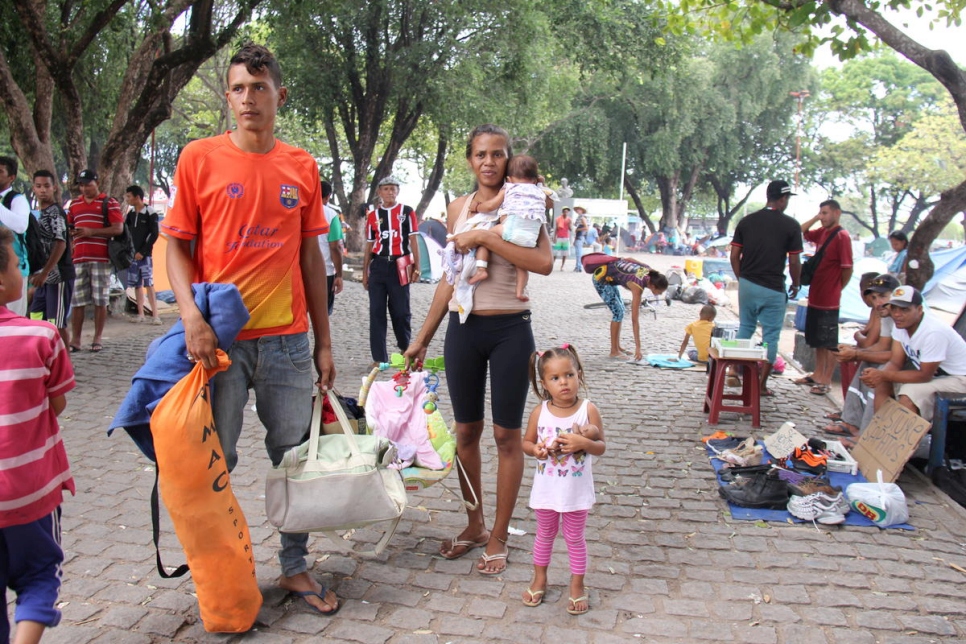Response stepped up in Brazil as Venezuelan arrivals grow
This is a summary of what was said by UNHCR spokesperson William Spindler – to whom quoted text may be attributed – at today's press briefing at the Palais des Nations in Geneva.

Venezuelan families sleeping in Simon Bolivar public square in Boa Vista's city centre are voluntary relocated to the Jardim Floresta shelter, with the help of UNHCR workers, the Brazilian Army, federal and local authorities. © UNHCR/Reynesson Damasceno
UNHCR, the UN Refugee Agency, working with the Brazilian Government and partners is ramping up the humanitarian response for the growing number of Venezuelans arriving in the north of the country with increasing needs.
According to the Government’s latest estimates, more than 800 Venezuelans are entering Brazil each day. As the complex political and socio-economic situation in their country continues to worsen, arriving Venezuelans are in more desperate need of food, shelter and health care. Many also need international protection.
More than 52,000 Venezuelans [1] have arrived in Brazil since the beginning of 2017. An estimated 40,000 have entered through the isolated northern state of Roraima and are living in Boa Vista, the state capital.
With numbers growing, public services such as health care and sanitation are becoming stretched. Authorities recently declared a state of emergency and have allocated BRL 190 million (approximately US$ 58 million) for emergency humanitarian assistance for people coming from Venezuela.
UNHCR has been working closely with the Brazilian Federal Government to register Venezuelans and ensure all arrivals have proper documentation. Once documented, Venezuelan asylum-seekers, as well as those with special stay permits, have the right to work, and access health, education and other basic services.
Brazil’s Federal Government Committee on the Emergency Response to the Venezuelan influx, which is coordinating the humanitarian response in Roraima, is working with UNHCR to ensure Venezuelans have access to health care and proper shelter, and that they are being provided with basic aid items such as personal hygiene kits and mattresses.
UNHCR and the Brazilian Authorities are increasingly concerned by the growing risks faced by those Venezuelans who are living on the streets, including sexual exploitation and violence. To meet shelter needs and mitigate these risks two new shelters in Boa Vista have been opened in the last two weeks. The new shelters can house 500 people each, and are nearly at capacity. Priority is given to families with children, pregnant women, elderly people and others with specific needs.
UNHCR is managing the new shelters, and our staff are doing biometric registration and issuing identification cards for food and aid distributions there. At the same time, the Federal authorities through the Brazilian army are providing three warm meals a day as well as physical security. The municipal government is conducting vaccinations on site
Meanwhile, we are working with the authorities to identify Venezuelans willing to relocate voluntarilly from Roraima to other parts of Brazil. Relocation will provide longer-term solutions for people in need and ease the strain on local communities and services in Roraima state. Two flights, operated by the Brazilian Air Force are leaving Boa Vista this week. One left yesterday, flying 104 Venezuelans to Sao Paulo. The second is expected today to Sao Pablo and Cuiabá, the capital of the Mato Grosso state located in the centre of the country.
So far, some 600 Venezuelans have been relocated to other cities, where local authorities and civil society groups are helping them integrate and become self-reliant. A UNHCR survey conducted by the Federal University of Roraima revealed that 77 per cent of Venezuelans currently living in Roraima hope to relocate to other parts of Brazil.
UNHCR is grateful to the actions of the Brazilian Government, including in keeping its borders open to Venezuelans and ensuring that all refugees and asylum-seekers in Brazil have access to basic rights and services.
UNHCR has recently requested from donors an initial US$ 46 million to implement its regional response plan for Venezuelans in the main host countries, Brazil included. So far, this plan is only 4 per cent funded. We’re calling on the international community for greater support to Brazil which has been generous in its response and needs further support to enhance reception capacities, prevent discrimination against Venezuelans, and ensure peaceful coexistence.
[1]Of the 52,000 Venezuelans living in Brazil, 25,000 are asylum seekers, 10,000 hold temporary resident visas, while the rest are working to regularizing their status.
For more information on this topic, please contact:
- In Brazil, Luiz Fernando GODINHO, godinho@unhcr.org, +55 61 818 709 78
- In New York, Kathryn MAHONEY, mahoney@unhcr.org, +1 347 443 7646
- In Geneva, William SPINDLER, spindler@unhcr.org, +41 79 217 30 11
